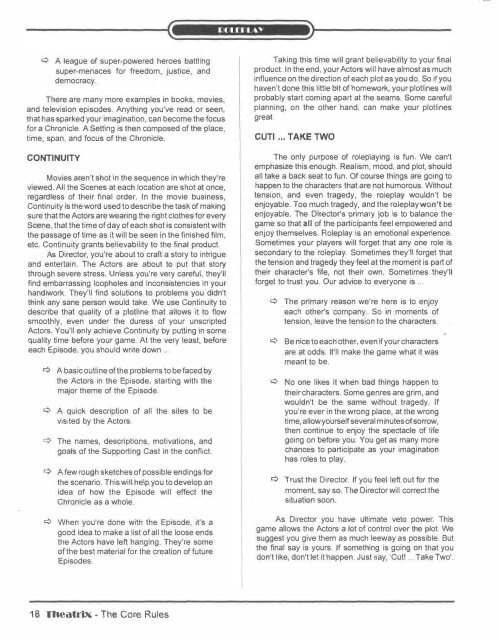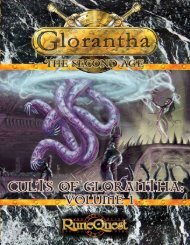Untitled - Index of - Free
Untitled - Index of - Free
Untitled - Index of - Free
You also want an ePaper? Increase the reach of your titles
YUMPU automatically turns print PDFs into web optimized ePapers that Google loves.
¢ A league <strong>of</strong> super-powered heroes battling<br />
super-menaces for freedom, justice, and<br />
democracy.<br />
There are many more examples in books, movies,<br />
and television episodes. Anything you've read or seen,<br />
that has sparked your imagination, can become the focus<br />
for a Chronicle. A Setting is then composed <strong>of</strong> the place,<br />
time, span, and focus <strong>of</strong> the Chronicle.<br />
CONTINUITY<br />
Movies aren't shot in the sequence in which they're<br />
viewed. All the Scenes at each location are shot at once,<br />
regardless <strong>of</strong> their final order. In the movie business,<br />
Continuity is the word used to describe the task <strong>of</strong> making<br />
sure that the Actors are wearing the right clothes for every<br />
Scene, that the time <strong>of</strong> day <strong>of</strong> each shot is consistent with<br />
the passage <strong>of</strong> time as it will be seen in the finished film,<br />
etc. Continuity grants believability to the final product.<br />
As Director, you're about to craft a story to intrigue<br />
and entertain. The Actors are about to put that story<br />
through severe stress. Unless you're very careful, they'll<br />
find embarrassing loopholes and inconsistencies in your<br />
handiwork. They'll find solutions to problems you didn't<br />
think any sane person would take. We use Continuity to<br />
describe that quality <strong>of</strong> a plotline that allows it to flow<br />
smoothly, even under the duress <strong>of</strong> your unscripted<br />
Actors. You'll only achieve Continuity by putting in some<br />
quality time before your game. At the very least, before<br />
each Episode, you should write down ...<br />
¢ A basic outline <strong>of</strong> the problems to be faced by<br />
the Actors in the Episode, starting with the<br />
major theme <strong>of</strong> the Episode.<br />
¢ A quick description <strong>of</strong> all the sites to be<br />
visited by the Actors.<br />
¢ The names, descriptions, motivations, and<br />
goals <strong>of</strong> the Supporting Cast in the conflict.<br />
¢ A few rough sketches <strong>of</strong> possible endings for<br />
the scenario. This will help you to develop an<br />
idea <strong>of</strong> how the Episode will effect the<br />
Chronicle as a whole.<br />
¢ When you're done with the Episode, it's a<br />
good idea to make a list <strong>of</strong> all the loose ends<br />
the Actors have left hanging. They're some<br />
<strong>of</strong> the best material for the creation <strong>of</strong> future<br />
Episodes.<br />
18 Theatrlx - The Core Rules<br />
Taking this time will grant believability to your final<br />
product. In the end, your Actors will have almost as much<br />
influence on the direction <strong>of</strong> each plot as you do. So if you<br />
haven't done this little bit <strong>of</strong> homework, your plotlines will<br />
probably start coming apart at the seams. Some careful<br />
planning, on the other hand, can make your plotlines<br />
great.<br />
CUTI ... TAKE TWO<br />
The only purpose <strong>of</strong> roleplaying is fun. We can't<br />
emphasize this enough. Realism, mood, and plot, should<br />
all take a back seat to fun. Of course things are going to<br />
happen to the characters that are not humorous. Without<br />
tension, and even tragedy, the roleplay wouldn't be<br />
enjoyable. Too much tragedy, and the roleplay won't be<br />
enjoyable. The Director's primary job is to balance the<br />
game so that all <strong>of</strong> the participants feel empowered and<br />
enjoy themselves. Roleplay is an emotional experience.<br />
Sometimes your players will forget that any one role is<br />
secondary to the roleplay. Sometimes they'll forget that<br />
the tension and tragedy they feel at the moment is part <strong>of</strong><br />
their character's life, not their own. Sometimes they'll<br />
forget to trust you. Our advice to everyone is ...<br />
¢ The primary reason we're here is to enjoy<br />
each other's company. So in moments <strong>of</strong><br />
tension, leave the tension to the characters.<br />
¢ Be nice to each other, even if your characters<br />
are at odds. It'll make the game what it was<br />
meant to be.<br />
¢ No one likes it when bad things happen to<br />
their characters. Some genres are grim, and<br />
wouldn't be the same without tragedy. If<br />
you're ever in the wrong place, at the wrong<br />
time, allow yourself several minutes <strong>of</strong> sorrow,<br />
then continue to enjoy the spectacle <strong>of</strong> life<br />
going on before you. You get as many more<br />
chances to participate as your imagination<br />
has roles to play.<br />
¢ Trust the Director. If you feel left out for the<br />
moment, say so. The Director will correct the<br />
situation soon.<br />
As Director you have ultimate veto power. This<br />
game allows the Actors a lot <strong>of</strong> control over the plot. We<br />
suggest you give them as much leeway as possible. But<br />
the final say is yours. If something is going on that you<br />
don't like, don't let it happen. Just say, 'Cut! ... Take Two'.



